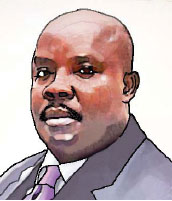When really did Nigeria’s military start seeing the South East as veritable ground for experimenting the capability of its marksmen or efficacy of its weaponry? When also did the Easterners develop the suicidal tendency of daring their killers even when not armed in any way?
Since the disturbances of Monday, May 30, in Nkpor and Onitsha, Anambra State, that saw many Igbo youths slaughtered by soldiers and men of the Nigeria police, I have not been able to push these two nagging questions off my mind. This is especially as the Monday mayhem fell into what had happened in Aba and Onitsha earlier.
The first leg of the questions, I must confess, is not original to me. It was actually my 11-year-old daughter, Chidiogo, that actually threw it up. I only strengthened it. While watching the news on the encounter between the country’s security agents on one hand, members of Indigenous Peoples of Biafra (IPOB) and their Movement for the Actualisation of the Sovereign State of Biafra (MASSOB) counterparts which led to the death of dozens of the agitators, she had asked, “Daddy, why are the police always killing these people?”
I was thrown off-balance instantly. As a parent, I owe it a duty to tell the truth at all times to my God, myself and my family, at least. But in this instance, what would I tell her? What would be my explanation for the constant onslaught on her people? And what really should I tell her is their offence that would make her understand?
A common denominator in the agitation by IPOB and MASSOB is revalidation of the Biafran enterprise that was interrupted in the 1967 to 1970 Nigerian Civil War.
Ordinarily, that revalidation agenda should have been driven by those who saw action in the days of the confusion; those who knew what the Biafra Dream represented and what they stood to gain from it if it did not encounter its sunset at dawn.
But the present-day agitators for Biafran independence are mostly young men and women who never knew anything about the defunct entity, except what they might have picked from story books or tales from their parents and elderly ones.
But these stories are usually laced with notes of caution – perhaps, a deliberate attempt to dissuade the listeners from being drawn into similar exercise, apparently on account of the ugly experiences that trailed the engagement.
It then becomes difficult to understand why many South East youths have not been successfully steered away from their growing attachment to Biafra. For one, the geographical environment that constituted the defunct republic is no longer intact.
The situations now cannot also be said to have strictly fitted into what it was when Chukwuemeka Odumegwu Ojukwu (of blessed memory) declared Biafra on May 30, 1967. But the fire burns in the youths and their mental picture gets enlarged every day.
This leads to the second leg of the question; the audacity of today’s Biafran youths against all odds.
Coming from the ashes of the field hostilities in 1970, the Igbo were meant to believe that the war was over. They were promised Reconciliation, Rehabilitation and Reconstruction. Even with obvious insincerity in implementing the policy as demonstrated in the paltry 20 pounds being handed to everyone with deposits in the banks no matter the volume of money previously kept, they bore their pains with dignity.
The parents, of course, did not derive any joy in regaling their children with these tales of a lost battle. They rather believed in Nigeria. Some even went as far as giving their children such names as Oguebego (the war is over), not as mark of cowardice but in forging a new beginning.
It is these children that are now asking questions and raising issues on unpleasant developments around them. They see in their region of birth abandoned or dilapidated federal government projects. When they cannot move between Onitsha and Enugu on account of the death trap that the expressway has turned to, aside other incidences of insecurity; when the same fate confronts them on Enugu/Port Harcourt highway; when they are being forced to connect flights from other zones to fly out of the country due to non-functional international airport in their area, their disillusionment in the country easily finds expression. When they are discriminated against in job recruitment and placement, admission into federal institutions not on the basis of non-qualification but because of the so-called quota system, you would see why their belief in the system is seriously shaken. Most painfully, when they are treated as second class citizens in places where they live and fulfil their civic obligations, it can be understood why their anger knows no bound.
So, when President Muhammadu Buhari, in his Al-Jazerra interview asked, “What do the Ibos (sic) want”, the answers were actually not far. And they are not. The Igbo, by nature, do not seek preferential treatment. They do not ask for special attention. All they demand are equal opportunities.
These, successive Nigerian administrations have shied away from. Buhari, who sarcastically asked what the Igbo wanted, has even shown more culpability in this regard. This can only explain why of the 53 appointments made by his presidency so far, aside the constitutional ministerial slots, only one position – the Director-General Voice of Nigeria (VON) is, assigned to a South East, Osita Okechukwu.
If Buhari compares this tokenistic gesture with his North West that has 28 appointees, North East (8), North Central (5), South West (5), South South (6), he should not require anybody to tell him what the Igbo really want.
By the time he does that, he will also realise that his vow of keeping Nigeria as one political entity does not necessarily require turning the South East to Nigeria’s killing field; it only requires dialogue and fair play. He will also agree that the people are never suicidal. If anything, they are enterprising and fun-loving.

- Advertisement -
- Advertisement -
Must Read
The Abia interim report
The Abia interim report: The beckoning challenge of the new ABIA is to leap from the dark ancestry of superstitious origins to...











